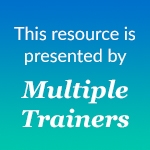
Search Results: criticism
-
Most of us subject ourselves to so many painful mental jabs and they seldom stimulate helpful change. We can be like a frustrated animal trainer repeatedly whipping an animal, without ever helping the animal to understand what behavior is wanted or offering encouragement. Instead, punishing thoughts can be stepping stones to awareness. We can focus on sensing what we're really aspiring to. This is more likely to eventually produce sustainable change that'll serve us better.
-
When asking for respect it helps to first get clear about your interpretations of other's behavior. You can do this by asking about the other's intentions before believing your thoughts. You can also make a clear request for what specifically you want to see happen instead. Read on for more.
-
You may want to shift power dynamics in intimate and family relationships -- especially if there's longstanding, unprocessed hurts. Reflect on where, when and with whom you tend to enter reactive “power over” patterns. Explore the feelings and needs that are up for you in those contexts. Imagine other ways that could meet your needs in, or before, those moments. In this way, in similar situations you can have more access to choice.
-
Yoram Mosenzon discusses judgmental dialogue and its hidden aim to meet needs. This often creates distance instead of fostering connection. Yoram introduces a self-connection exercise to improve the chances of dialogue becoming more enriching and life-serving.
-
Trainer Tip: If you make a specific and doable request as soon as you notice your needs, you'll have a better possibility of getting them met. It's also more likely your request will support the other person to contribute to your life. Make at least one specific, doable request of someone today as soon as you notice your needs.
-
How is empathy in the workplace a professional skill? If you are ready to learn why and how empathy is the critical factor to more productivity, profitability and collaboration in the workplace, this recording is for you!
-
We can trick ourselves into keeping the status quo, feeling unworthy, and blocking access to critical awareness necessary that allows for new creative solutions to emerge -- when we think in terms of who has "earned" or “deserved” what.
-
Join Kathleen for a gentle, compassionate exploration and embracing of your true self. Reclaim your self-worth, experience greater freedom when expressing your self and actually celebrate who you are in the world. Delve into what self-love is and is not – including how to distinguish self-worth from negative cultural labels such as self-obsession and selfishness.
-
Trainer Tip: Stating our observations, feelings and needs can still be heard as criticism if we don't follow it up right away with a specific, doable request. Ending your statement with a request for what you want can clarify the situation and reduce the chances that you'll be met with defensiveness. Read on for an example.
-
In this inspiring audio, Kelly Bryson, veteran CNVC Certified Trainer and author of many NVC books and articles, explores the importance of setting a clear intention and then clarifies the difference between pain and suffering.
-
Experience the remarkable healing power of self-empathy, guided by CNVC Certified Trainers, Mary Mackenzie and Raj Gill. In this audio course, the trainers lead participants through a demonstration, and then supplement the learning with discussion and answers to questions.
-
How do we live each and every day from the “living energy of needs” – with the unimpeded fullness of life’s energies flowing through us, regardless of the conflicts or life circumstances we may be experiencing? Through developing deep self-compassion. How can we experience our inner world from a place of utter and total compassion? When we practice compassionate self-care, we create an inner spaciousness that allows our life’s energies to flow. In that spaciousness both healing and inner transformation occurs. Robert’s work explores the interweaving of two co-intentions—to live life from the fullness of the “beauty of needs” and to approach every experience with deep compassion.
-
The human brain is a conservative organ that comprises different systems with varying degrees of conscious awareness, which evolved in three basic stages of human history (the lizard-squirrel-monkey brain.) In my understanding, we could say, the brain has strong needs for understanding, order, predictability and meaning. In fact, one of its key functions is to process experiences, and predict what the world is like, in order to maximize survival. CNVC Certified Trainer Stephanie Bachmann Mattei explores the biological basis of our inner jackal voices.
-
Trainer Tip: Accepting our true feelings, needs and values can lead us to a more compassionate life. Are you being true to yourself?
-
When building successful relationships, it can be very helpful to see yourself as a collection of different inner parts that developed due to various life experiences. Without empathy and acknowledgment, our inner parts tend to work against us. That's when we're called upon to build and develop our inner leadership...
-
When was the last time you were in a situation with an overwhelming feeling of shame or an unnerving fear of 'doing it wrong'? Sometimes we get sweaty palms or a dry mouth, maybe we freeze on the spot or start an unhelpful internal monologue that makes the situation feel even worse. In this months NVC Life Hack Gesine takes a closer look at her own experience with shame and the fear of doing it wrong.
-
Trainer Tip: Sometimes our actions keep us from meeting our needs. Let’s say you long for connection with others, but you are also afraid of it, so you push people away. Then you tell yourself that no one likes you, resulting in depression and self-criticism. Self-empathy can help clarify what we truly want rather than focusing on what is wrong with others or ourselves, and help us align in ways more likely to meet our needs.
-
Sylvia Haskvitz uses 20+ years of experience to introduce the core concepts of Nonviolent Communication, leaving you grounded in the basics and ready to make transformative improvements to the quality of your communication.
-
Inbal answers a parent's question about praise and offers a perspective on how praise translates into the NVC framework.
-
Listen to Jim and Jori Manske share their understanding of discernment to gain clarity, insight, and wisdom for making life-serving distinctions and choices.





















